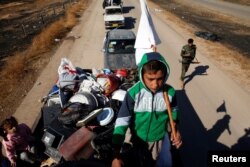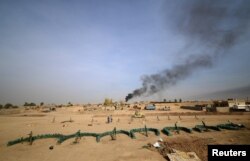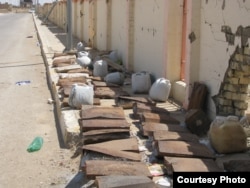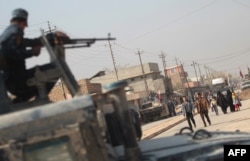The kids sitting in the battered car fleeing the besieged Iraqi city of Mosul were wide-eyed at the towering armored trucks and the hordes of soldiers from Iraq’s Golden Division in their trademark black combat fatigues. Playing up for reporters and photographers at the checkpoint, they described the airstrikes they had endured with even wider-eyes.
Then one youngster — no older than five — pointed at his brother, a pre-teen also, giggled, and announced, “He’s Daesh.”
His veiled mother shook her head in horror.
A lighthearted moment maybe from one perspective, but finger pointing has already begun in earnest as the territory controlled by the Islamic State terror group in Iraq shrinks.
Risks of intra Sunni bloodbath
Iraq is no stranger to bloody cycles of revenge and the playing out of family, tribal as well as sectarian vendettas. As the Mosul offensive unfolds the danger of Shi’ite atrocities has been highlighted by rights groups, who have urged the Iraqi government not to allow Shi’ite militias to enter the city. But there are high risks also of an intra Sunni bloodbath as the Islamic State terror group is driven, albeit painfully slowly, from Iraq’s second largest city.
Sunnis who suffered at the hands of the jihadists, who saw relatives butchered by militants or were forced and threatened to give up a daughter for marriage to an extremist, are likely to take out their anger on fellow Sunnis — even neighbors — who collaborated with the terror group, predict analysts.
And those seeking revenge may not be so discriminating in distinguishing between major IS members and supporters, lower-ranking members, sympathizers and those who went along just to survive.
“Most of the prominent members and most aggressive militants will be killed in the fighting or will get out and head to Syria,” says political psychologist Maha Hassan Bukir, an academic at Salahaddin University in Irbil. “In that case, people won’t be able to find those militants most responsible for their suffering and they will punish anyone they can find associated in anyway with Daesh,” she worries.
Bukir observed the revenge cycle that built up after the 2003 U.S. invasion of Iraq and the ouster of Saddam Hussein.
“People extracted revenge from Baathists, many of whom fled their homes and tried to hide themselves in other Iraqi cities or left the country and went to Syria,” she says. And many of those Baathists later joined IS, bringing to the terror group their military expertise.
“In my opinion we will see a similar revenge cycle playing out in Mosul. Most likely it won’t happen immediately, but sooner or later we will see it,” she says.
Revenge
The scale of the revenge will depend, she reckons, on how quickly the Baghdad government establishes law and order in the city and rebuilds, reducing the general fury and dissipating the pent-up frustration with day-to-day challenges that could feed the urge for revenge.
While in smaller and more homogeneous Iraqi towns, tribal chiefs would have the clout to minimize retaliation and be able to oversee a rough-and-ready system of “transitional justice,” including blood-money payments, in Mosul their power to do so is much less.
In Ramadi, 430 kilometers to the south of Mosul, following both the defeat of the jihadists there in 2006 and last year, the tribal chiefs were able to tamp down anger within the Sunni community and prevent a retaliation dynamic.
“When they tell people to fight, they do so; when they order a ‘stop,’ people stop,” says Bukir. In any case, the tribes in Ramadi en masse supported IS at the start under instructions from the tribal chiefs, and then withdrew support subsequently and switched to backing the central government when told to do so.
Mosul, though, is home to many Sunni tribes and clans as well as a mixture of sectarian and ethnic groups, making it a much more complicated place where a handful of chiefs aren't able to put their heads together and solve problems by consensus.
On top of that, IS militants have upset fragile power balances not only between tribes but within them, disrupting hierarchies by marrying into them and by boosting the authority of a younger generation of leaders.
Money — either through the form of general subsidies to help tribes rebuild or even compensation from the central government for a loss of a family member — could help reduce widespread fury, says Bukir. She and other analysts say the Iraqi government needs to think carefully about transitional justice and how it manages post-IS Mosul, not only to cut down on violence on moral grounds but in order to stop it spinning out of control and sowing the seeds of a jihadist successor to Abu Bakr al-Baghdadi’s terror group — an IS 3.0.
“They should prosecute only the most egregious IS members and collaborators,” she argues. A truth-telling commission would also help, allowing grieving victims to vent their anger. That is not likely to happen though.
Kurdish journalist Nzar Zrar Gzali, director of Awene newspaper in Irbil, Iraqi Kurdistan’s capital, suspects little can prevent retaliation and that it could be even bloodier than what has been seen before. “People will want to avenge sexual dishonor and shame,” he says, “because of the Daesh forced marriages.”
Feelings of guilt, he thinks, will drive some who went along with IS to be especially violent, using revenge as a vehicle for catharsis.








